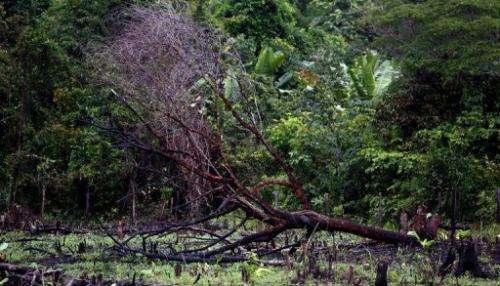Brazil president makes final changes to forestry law

Brazilian President Dilma Rousseff has vetoed nine articles of a new forestry code approved by Congress that environmentalists said would lead to further deforestation in the Amazon rainforest.
Environment Minister Izabella Teixeira said the vetoes dealt with the most radical aspects of the measure introduced by the pro-agribusiness bloc in Congress, and were meant to prevent any incentive to more deforestation or an amnesty for those responsible for illegal logging.
"No to amnesty, no to encouragement of illegal logging," she noted.
The final text of the law, including the vetoes, came into effect Thursday after it was published as a presidential decree in the Official Gazette late Wednesday.
It was the president's last word on the disputed reform over which pro-farm lobby and environmentalists have locked horns for years.
"Farmers have obtained the legal security they needed to produce. This is the end of the environmentalist hegemony regarding environmental issues," a happy Senator Katia Abreu, president of the National Agricultural Confederation and head of the pro-farm bloc in the Senate, told AFP.
She defended the new code, including the vetoes, and insisted that Brazil continues to have "one of the strictest laws in the world" on environmental protection.
But environmentalists saw the text as a step back.
"The presidential veto slightly improves the text approved by Congress, which was awful, but the result continues to be very bad," said Paulo Adario, the Greenpeace expert on the Amazon.
He added that the new code is not tough enough with respect to recovery of deforested areas and it reduces forest protection, for example on river banks.
Andre Lima, an expert of the Amazon Environment Research Institute (IPAM) said the law "created several amnesties for small producers who will not be punished for having deforested and others will be able to do the same."
"We can conclude that illegal loggers won and society lost," said ex-presidential candidate and leading environmentalist Marina Silva earlier this week.
The previous code, which dates back to 1965 and which farmers said was not being respected, limits the use of land for farming and mandates that up to 80 percent of privately-owned land in the Amazon rainforest remains intact.
The new text allows landowners to cultivate riverbanks and hillsides that were previously exempt, and would provide an amnesty from fines for illegally clearing trees before July 2008.
In May, Rousseff had already removed 12 controversial articles and made 31 modifications to the text.
Authorities say key reasons for the destruction of the world's largest rainforest are fires, the advance of agriculture and stockbreeding, and illegal trafficking in timber and minerals.
Deforestation has slowed since Brazil declared war on the practice in 2004, vowing to cut it by 80 percent by 2020.
Between 1996 and 2005, 19,500 square kilometers (7,530 square miles) of forest was cut down on average, peaking in 2004 when more than 27,000 square kilometers was lost.
Better law enforcement and the use of satellite imaging saw the lowest rate of deforestation in 2011 since records began three decades ago. Just over 6,200 square kilometers was cut, a 78 percent reduction on 2004.
(c) 2012 AFP



















